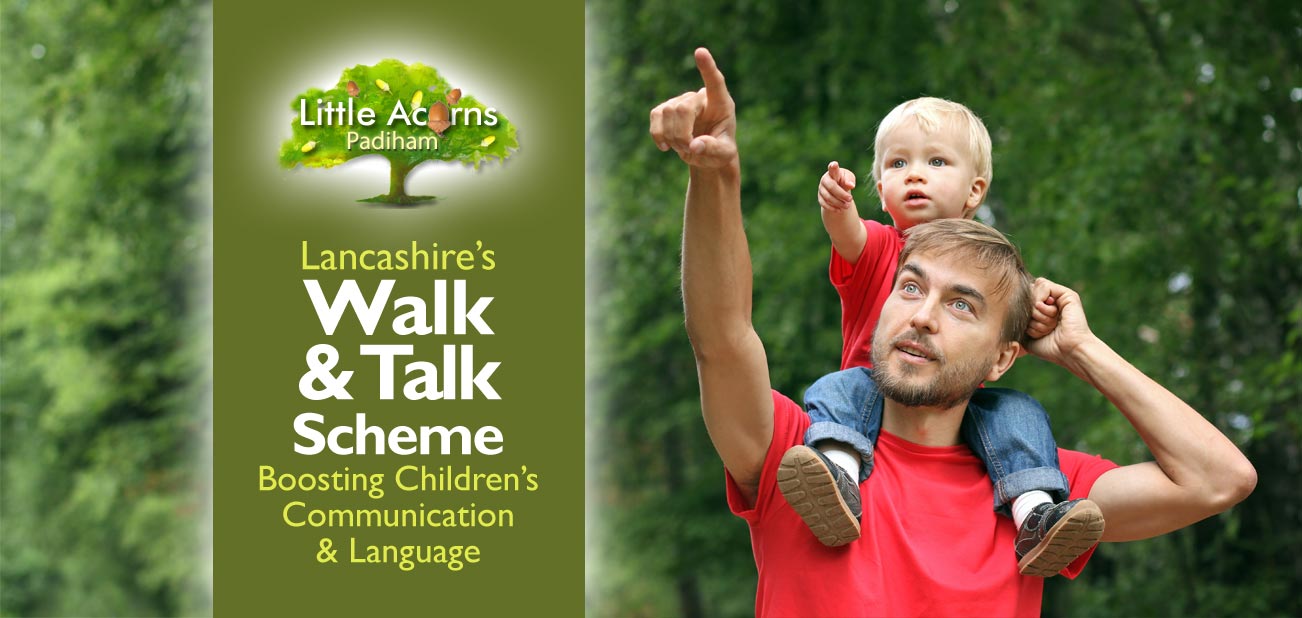
 Lancashire’s Walk & Talk Initiative is a scheme that’s wholeheartedly supported by the childcare practitioners at Little Acorns Nursery in Padiham. We encourage all Lancashire parents to take part too. It’s an initiative that is incredibly simple but has far-reaching benefits for children in their early years. Let’s take a look today at what Walk & Talk is all about, what its aims are, the benefits to children, and how families can get involved.
Lancashire’s Walk & Talk Initiative is a scheme that’s wholeheartedly supported by the childcare practitioners at Little Acorns Nursery in Padiham. We encourage all Lancashire parents to take part too. It’s an initiative that is incredibly simple but has far-reaching benefits for children in their early years. Let’s take a look today at what Walk & Talk is all about, what its aims are, the benefits to children, and how families can get involved.
What is the Walk & Talk Scheme & Where Did it Come From?
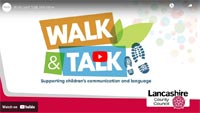 The Walk & Talk scheme is an initiative started by Lancashire County Council back in September 2022. The idea is simply to encourage families to get outdoors and, while doing so, to communicate with each other whilst they walk so that children can improve a variety of skills. As their explanatory video explains, going for a walk helps children hone attention skills, listening skills and, when proactively conversed with, communication and language skills too.
The Walk & Talk scheme is an initiative started by Lancashire County Council back in September 2022. The idea is simply to encourage families to get outdoors and, while doing so, to communicate with each other whilst they walk so that children can improve a variety of skills. As their explanatory video explains, going for a walk helps children hone attention skills, listening skills and, when proactively conversed with, communication and language skills too.
Key Aims of the Scheme
Key aims of the Walk & Talk Initiative include:
 a reduction in the ‘word gap’ — helping children learn new words and widen vocabulary;
a reduction in the ‘word gap’ — helping children learn new words and widen vocabulary;- supporting parents with ideas for deeper interactions with their children;
- encouraging adults to talk with children more during everyday activities;
- garnering a deeper sense of curiosity in children;
- encouraging conversational skills in children, for example, knowing how to take turns when discussing things;
- getting children outdoors more often — it’s great for their well-being.
The Walk & Talk Scheme
There are so many beautiful places in Lancashire where families can explore. While doing so, they can both walk and talk with little ones to promote the importance and benefits of communication.
“Our Walk & Talk initiative aims to get families outside and promote the importance of communication.” (Lancashire District Council)
 The scheme also aims to encourage children to use a variety of senses. These include, for example, sight, smell, touch, taste, hearing and, of course, active listening. When out on walks there are so many different things for children’s senses to be stimulated by and each lends itself to a conversation. Whether it’s the sound of birdsong, the feeling of the wind on their faces, the smell of freshly-cut grass on the breeze, the noise of traffic, the dazzlingly beautiful colours of blossom, or the mouth-watering smell of food cooking around the neighbourhood or town, walking is indeed a feast for the senses.
The scheme also aims to encourage children to use a variety of senses. These include, for example, sight, smell, touch, taste, hearing and, of course, active listening. When out on walks there are so many different things for children’s senses to be stimulated by and each lends itself to a conversation. Whether it’s the sound of birdsong, the feeling of the wind on their faces, the smell of freshly-cut grass on the breeze, the noise of traffic, the dazzlingly beautiful colours of blossom, or the mouth-watering smell of food cooking around the neighbourhood or town, walking is indeed a feast for the senses.
The secret, of course, is for adults to discuss such things with the children and that’s all a part of what the Walk & Talk initiative is all about. So, whether you’re at the beach, in a shop, at the park, in the garden, or out in the street with a child, take every opportunity to ask them to describe what they see, hear, feel, touch and, when appropriate, taste. Feed back to them too, to expand the conversation.
Get Involved
“Let’s make walking and talking a priority.” (Lancashire District Council)
Walk & Talk Examples
Stuck for ideas of what to talk about as you walk with your child, or do you need some examples to get you started? No problem. Here are a few ideas to give you a flavour of the type of conversations you can start with your little one.
 When you’re walking along streets, in town, or travelling on roads with your child, ask them to spot and name any numbers on signs, road signs, number plates, or buses. Ask them how many wheels the bus or lorry has. What noise do the cars make when they pull off from the traffic lights? What does a red traffic light mean? How about a green one? Have they noticed the difference between the sound of an electric car compared to a petrol or diesel one?
When you’re walking along streets, in town, or travelling on roads with your child, ask them to spot and name any numbers on signs, road signs, number plates, or buses. Ask them how many wheels the bus or lorry has. What noise do the cars make when they pull off from the traffic lights? What does a red traffic light mean? How about a green one? Have they noticed the difference between the sound of an electric car compared to a petrol or diesel one?
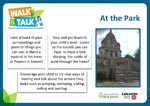 If you’re at the park with your child, get them to notice things around them and point them out to you. Examples might include flowers, dogs going for a walk, ducks on the lake, birds, bees, and different types of leaves. Discuss them. Perhaps even encourage your child(ren) to make up a poem about what they see or hear.
If you’re at the park with your child, get them to notice things around them and point them out to you. Examples might include flowers, dogs going for a walk, ducks on the lake, birds, bees, and different types of leaves. Discuss them. Perhaps even encourage your child(ren) to make up a poem about what they see or hear.
 Similarly, you can instigate a conversation with them about the flora and fauna in a garden. Can they spot and describe a butterfly? What is the butterfly doing? What is a bee doing and why are they important? (Click the thumbnail images for more ideas).
Similarly, you can instigate a conversation with them about the flora and fauna in a garden. Can they spot and describe a butterfly? What is the butterfly doing? What is a bee doing and why are they important? (Click the thumbnail images for more ideas).
 At the local shops, you might ask your little one what they can hear, for example background music, the babble of chattering people, tills being used to scan items, and so on. How many bananas do we need this week? Can you fetch them for me, please? Let’s discuss what’s left on the shopping list. And can they smell the lovely scent of food cooking in the bakery section?
At the local shops, you might ask your little one what they can hear, for example background music, the babble of chattering people, tills being used to scan items, and so on. How many bananas do we need this week? Can you fetch them for me, please? Let’s discuss what’s left on the shopping list. And can they smell the lovely scent of food cooking in the bakery section?
Tips for Successful Communication with Your Child
- Get their attention, for example, by saying their name or by pointing out something interesting during the walk.
- Try getting down to their level. There, you can communicate face to face whilst ensuring they’re actively engaging with you and looking at or listening to things you’re pointing out to them.
- Ensure they know you’re listening and responding to them too, for example, through what you say, nodding, keeping good eye contact, not interrupting, avoiding finishing sentences for them, and so on.
- Allow your child(ren) proper time to respond to something you’ve pointed out or asked them about. While their language skills and knowledge are still developing, they’ll need more time to respond than an adult might.
- When appropriate, add extra verbal detail for them to build on their language, knowledge and understanding of conversations.
- If your child expresses an interest in something, ensure you follow that interest and explore it further with them. When they’re already interested, you are pushing at an open door.
- Say, “well done” to them and give them praise when they do well, for example, when they learn a new word, phrase, or fact.
- Don’t forget that communication is not just verbal and children will therefore need to take your lead in the way you also use facial expressions and body language to convey some types of communication.
- Remember too that every activity is an opportunity for talking, communication, and learning.
- Make it fun! When you make walking and talking with your child fun, they’re more likely to enjoy and learn from it.
A High-Quality Early Years Education at Little Acorns Nursery, Padiham
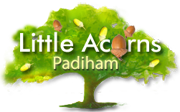 Fostering good communication and language skills is, of course, all part of the wonderful early years education that children under five gain at Little Acorns Nursery in Padiham, Lancashire. Indeed, we nurture all aspects of the learning and development of all our babies, toddlers and preschoolers; we bring out the very best in them to ensure they have all the tools to thrive and succeed in every way possible. So, if you are looking for the best nursery for your child in Padiham or live nearby in Hapton, Rose Grove, Burnley, Altham, Huncoat, Read, Simonstone, Sabden, Higham or Wood End, contact us to explore a possible place for your child at our exceptional nursery and preschool. We’ll be happy to answer any questions, show you and your little one around, or register your child for a childcare place.
Fostering good communication and language skills is, of course, all part of the wonderful early years education that children under five gain at Little Acorns Nursery in Padiham, Lancashire. Indeed, we nurture all aspects of the learning and development of all our babies, toddlers and preschoolers; we bring out the very best in them to ensure they have all the tools to thrive and succeed in every way possible. So, if you are looking for the best nursery for your child in Padiham or live nearby in Hapton, Rose Grove, Burnley, Altham, Huncoat, Read, Simonstone, Sabden, Higham or Wood End, contact us to explore a possible place for your child at our exceptional nursery and preschool. We’ll be happy to answer any questions, show you and your little one around, or register your child for a childcare place.


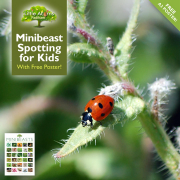

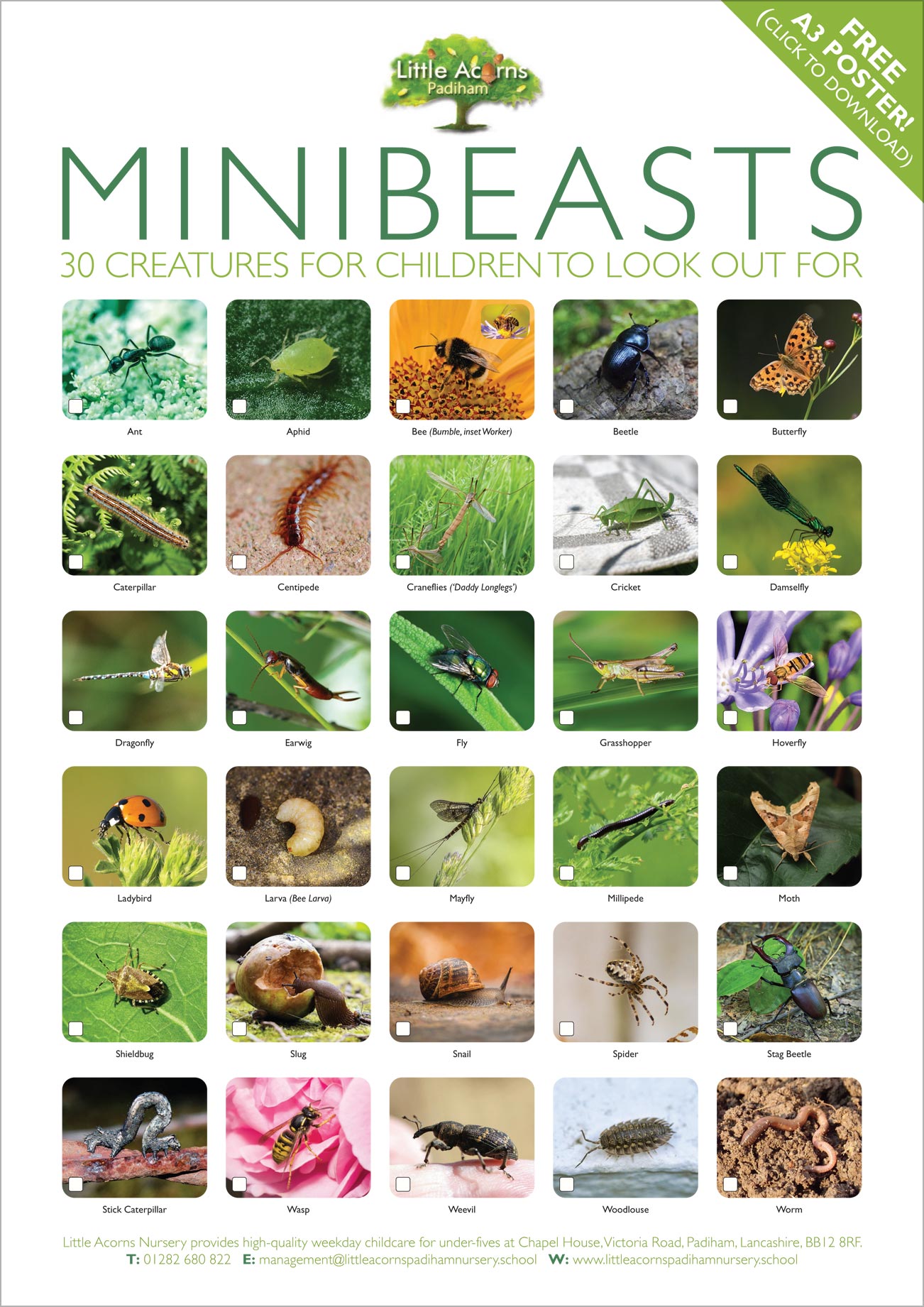

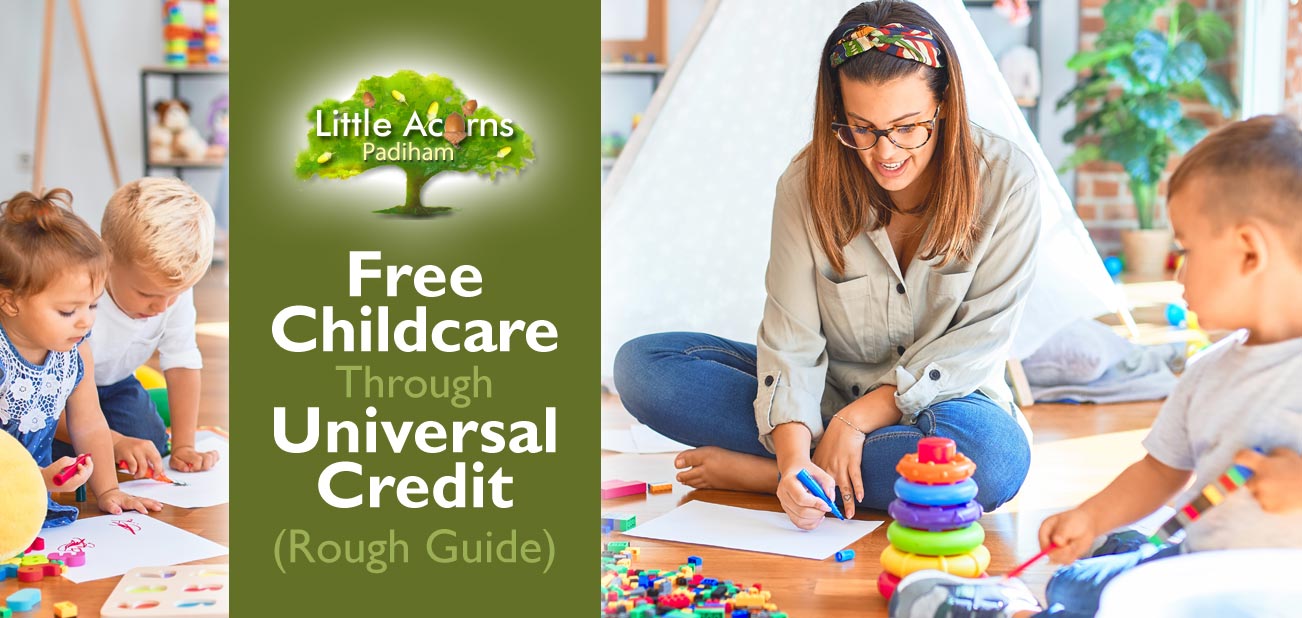
 Usually, you will need to pay for childcare costs first and then reclaim them through your Universal Credit childcare support account. However, there are some circumstances where you may be able to get some of your childcare costs paid upfront through the scheme. This recent change is designed to help families essentially with cash flow so that a major barrier to working is removed. That, in turn, will also help the economy.
Usually, you will need to pay for childcare costs first and then reclaim them through your Universal Credit childcare support account. However, there are some circumstances where you may be able to get some of your childcare costs paid upfront through the scheme. This recent change is designed to help families essentially with cash flow so that a major barrier to working is removed. That, in turn, will also help the economy.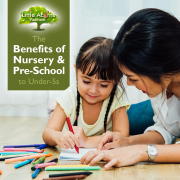
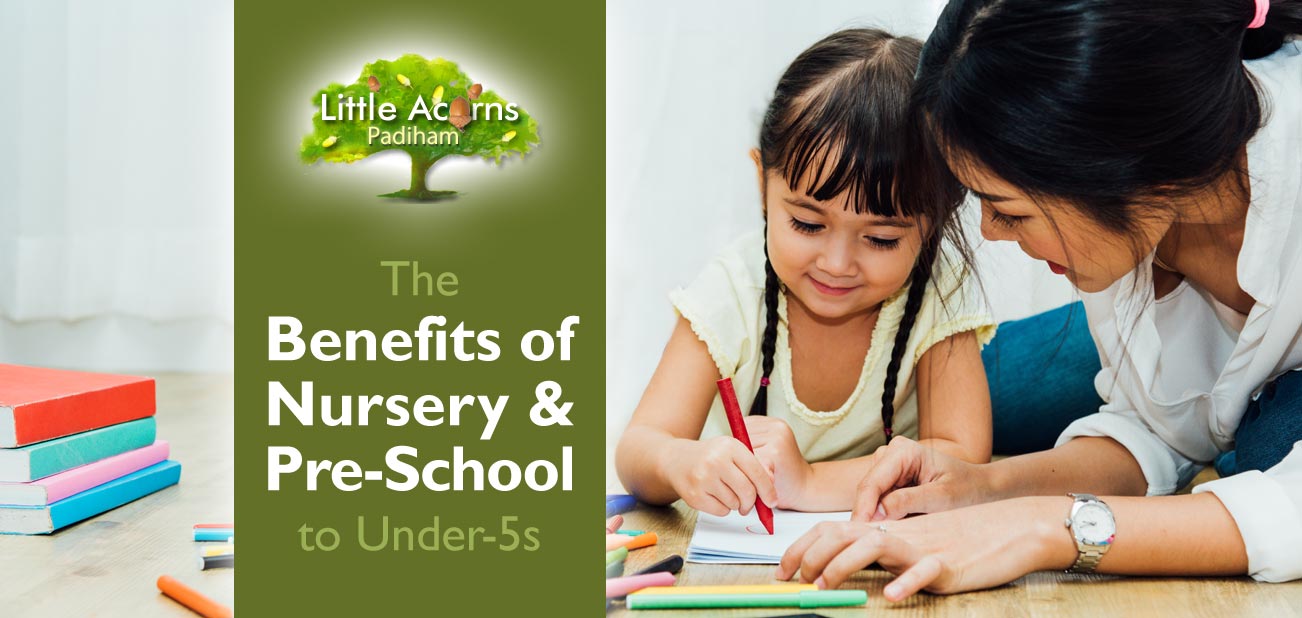
 A good nursery or pre-school is so much more than just a crèche, playgroup, kindergarten or childminding service.
A good nursery or pre-school is so much more than just a crèche, playgroup, kindergarten or childminding service.  Nurseries like Little Acorns in Padiham provide a dynamic environment where children mostly learn through different types of play and pre-planned, carefully structured activities. Much of their learning is achieved through the application of the
Nurseries like Little Acorns in Padiham provide a dynamic environment where children mostly learn through different types of play and pre-planned, carefully structured activities. Much of their learning is achieved through the application of the  A good early years childcare provider like Little Acorns will also nurture every aspect of children’s personal development. Research suggests that starting childcare and a good early years education at a young age can have significant positive effects on children’s development.
A good early years childcare provider like Little Acorns will also nurture every aspect of children’s personal development. Research suggests that starting childcare and a good early years education at a young age can have significant positive effects on children’s development. Spending time at nursery and pre-school provides children with countless opportunities to interact with peers and to learn to socialise with others. Through doing so, they’ll develop their social skills generally, including things like learning good manners, needing to sometimes share or take turns, learning about mutual respect, and following rules.
Spending time at nursery and pre-school provides children with countless opportunities to interact with peers and to learn to socialise with others. Through doing so, they’ll develop their social skills generally, including things like learning good manners, needing to sometimes share or take turns, learning about mutual respect, and following rules. Good nurseries and pre-schools like Little Acorns welcome and support children of all abilities. As part of this and whenever possible, they will create an inclusive environment for children with special educational needs or disabilities (SEND). They’ll support them in every way they can including, where possible, provision of special equipment, adapting the environment to make it more accessible, and obtaining additional funding for extra resources. They’ll even work with outside professionals, where appropriate, to develop the best ‘joined-up’ plan to support children. The result is a positive and responsive culture where children feel comfortable and valued, irrespective of ability or disability.
Good nurseries and pre-schools like Little Acorns welcome and support children of all abilities. As part of this and whenever possible, they will create an inclusive environment for children with special educational needs or disabilities (SEND). They’ll support them in every way they can including, where possible, provision of special equipment, adapting the environment to make it more accessible, and obtaining additional funding for extra resources. They’ll even work with outside professionals, where appropriate, to develop the best ‘joined-up’ plan to support children. The result is a positive and responsive culture where children feel comfortable and valued, irrespective of ability or disability.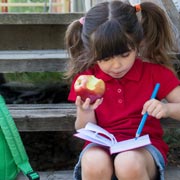 All of the above will really help children to develop the skills and confidence they need to absolutely thrive once they start at primary school. As well as being more able and literate from the moment they start, they’ll more easily be able to follow routines, listen to instructions, and work independently. They’ll absolutely hit the ground running with the existing knowledge, tools and abilities that they learned during their all-important early years. Indeed, those children who receive a high quality early years education have been shown to attain higher grades in their GCSEs and can be the equivalent of a year ahead by the time they reach the age of 15.
All of the above will really help children to develop the skills and confidence they need to absolutely thrive once they start at primary school. As well as being more able and literate from the moment they start, they’ll more easily be able to follow routines, listen to instructions, and work independently. They’ll absolutely hit the ground running with the existing knowledge, tools and abilities that they learned during their all-important early years. Indeed, those children who receive a high quality early years education have been shown to attain higher grades in their GCSEs and can be the equivalent of a year ahead by the time they reach the age of 15.